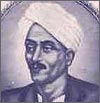 Vishwanath
Kashinath Rajwade was born in Poona on 12 July
1864 in a comparatively poor but respectable
Chitpavan Brahmin family. His father was an
ordinary legal practitioner and died when Rajwade
was only three years old. His mother somehow
or other pulled on and educated both Vishwanath
and his elder brother Vaijanath. Vishwanath
Kashinath Rajwade was born in Poona on 12 July
1864 in a comparatively poor but respectable
Chitpavan Brahmin family. His father was an
ordinary legal practitioner and died when Rajwade
was only three years old. His mother somehow
or other pulled on and educated both Vishwanath
and his elder brother Vaijanath.
Rajwade passed his Matriculation examination
in 1882, persuaded his college studies in Bombay
and Poona and completed graduation.He either
conducted public service classes or served in
a school in Poona for about three years. During
this period he married and had two children.
Both his wife and his children died shortly
after.
He was only twenty-nine when this calamity struck
him. But the idea of remarrying never entered
his mind. After the calamity he left the service
and never thought of serving anywhere else again.
Instead, he decided to devote his life to research
in history, sociology, linguistics and other
humanistic subjects. His wide reading, the shining
examples of the lives of Tilak, Agarkar and
others before him and his natural tendencies
and inclinations towards intellectual pursuits
must have made him decide that way.
However, from 1893 to the end of his life, without
paying the least heed to the problem of his
maintenance, he devoted himself to the study
of history, to collection of material for research
in history, and other works on the subject and
to publishing the results of his studies.
It became the mission of his life. This resulted
in the publication of the ‘Sources of Maratha
History’ (in 22 volumes); ‘Mahikavatichi
Bakhar’ or a narrative about Mahim (thana);
‘Radhamadhava Vilasachampu’, a poem
of Radhamadhava and Shahaji; ‘Jnanesvari
and its Grammer’ (in 2 volumes); ‘On
the Formation of Marathi Nouns and Verbs’
(in 2 volumes); ‘Marathi Bhasecha Ulgada’
or the structure of the Marathi Language; ‘Etymological
Dictionaries of Marathi Nouns, etc., and Verbs’,
originally compiled by Rajwade but edited and
published by others after his death (in 2 volumes),
and stray articles on a variety of subjects.
For the collection of source material he visited
hundreds of villages and towns in and out of
Maharashtra, many times on foot as some of the
places had no cart-tracks even, salvaged thousands
of Marathi letters, narratives, Chronicles,
etc., copied them then and there as the owners
would not like to part with them and arranged
for their publication at a great sacrifice,
even by incurring debts which he could not repay.
The first twenty-two volumes contain about eight
thousand pages of Marathi records, mostly original
correspondence, shedding light on the various
aspects of Maratha history.
These were collected from a number of old historical
families and |
belonged to the last
quarter of the 16th century and to the 17th
and 18th centuries. Out of these, the records
of the 16th and 17th centuries are of supreme
importance as such records are not to be found
in any Public Record Office in Maharashtra or
India. ‘Mahikarathchi bakhar’ is an
old narrative on the social set-up of the inhabitants
of Northern Konkan. ‘Radha-madhava-Vilasachampu’
is a multilingual composition, giving the amorous
actions of Radha and Madhava in the former portion
and the life and activities of Shahaji Bhonsale
in the latter portion.
‘Jnaneswari and Its Grammer’ gives
the oldest recension of ‘Jnaneswari’,
a standard Marathi poetical work-a commentary
on the Bhagvad Gita-of the 13th century and
Rajwade also explains the grammer of that recension.
His next two works deal with the formation of
Marathi nouns and verbs. In the following work
Rajwade details the structure of the Marathi
language. Regarding the Dictionary of Marathi
Nouns, the slips of entries of Marathi nouns,
etc., prepared by Rajwade Samshodhaka Mandala
of Dhulia published them without any special
editing work.
Regarding the Dictionary of Marathi Verbs,
the slips of the entries were also made ready
by Rajwade. But his pupil, K. P. Kulkarni,
gave a finishing editorial touch to them.
Rajwade’s stray articles deal with a
variety of subjects falling under the heads
History, Sociology, Religion, Culture, etc.,
of India including even the current political
conditions and movements. His very long introductions
to some of these evince his erudition and
the pains taken by him.
He was a true nationalist. He never wore foreign
cloth. Though he lived during the British
rule, he was a complete non-cooperator. He
abhorred the idea of receiving any help from
the foreign Government directly or indirectly,
and for that reason, voluntarily accepted
a life of extreme poverty and even suffered
the mission of his life to be jeopardized.
He wrote only in Marathi, his mother tongue,
and thereby enriched the Marathi language
and literature. He firmly believed in the
notion that India’s bondage was the result
of the utter negligence of Indians in acquiring
up-to-date knowledge of the physical sciences
and of their use in everyday life.
His writings show that he was an intellectual
giant and a man of versatile talents and possessed
an extraordinary power of imagination. Equipped
with a deep knowledge of humanistic subjects,
he wrote in such a forceful and lucid language
that his readers were easily led into believing
in the authenticity of his theories. It is
only after much deep and balanced thinking
and wide reading that one can find the inaccuracies,
flaws, etc., in his writings. Still they will
ever remain a source of inspiration and his
publication of source material will surely
immortalise his name.
|